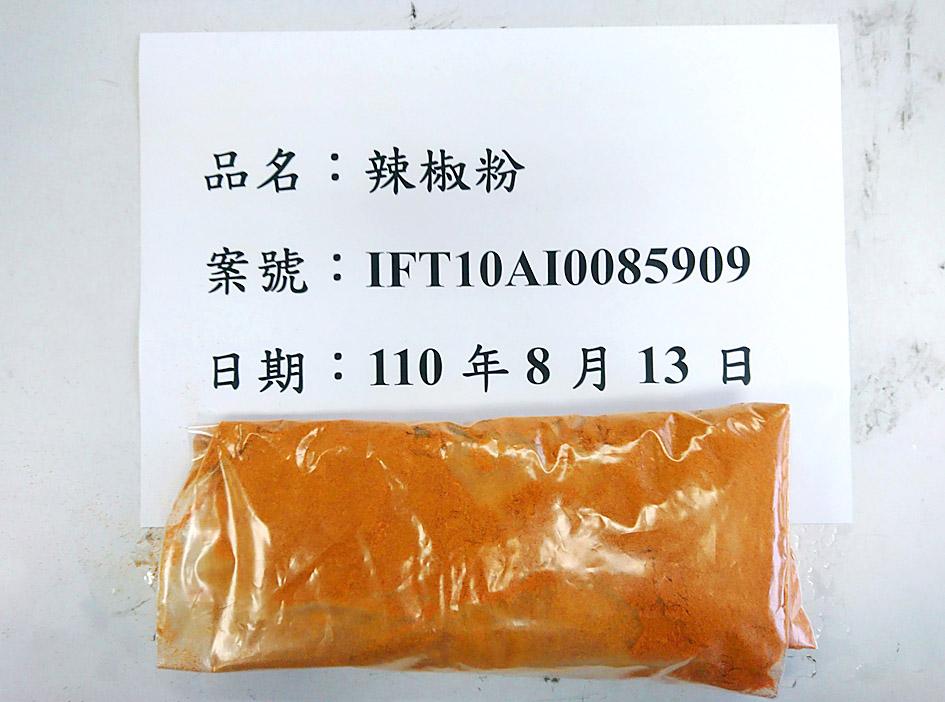Customs officials have seized a shipment of cayenne pepper powder from China after it was found to contain a prohibited coloring agent, the Food and Drug Administration (FDA) said yesterday.
The cayenne powder, shipped by Long Hai Tong Ji Foods Co, was seized because it was found to contain 7 parts per million of a dye called Sudan III, the agency said.
The use of the chemical substance is banned in Taiwan, FDA division head Chen Ching-yu (陳慶裕) said.

Photo: CNA
It was not the first time that the illegal coloring agent was found in imported items from China, Chen said, adding that the agency would bolster inspections of such imported products.
Yen Tzung-hai (顏宗海), director of Linkou Chang Gung Memorial Hospital’s Department of Clinical Toxicology, said Sudan III is a soluble diazo dye used to color industrial substances such as oils, waxes and plastics.
When consumed, the series of Sudan dyes — I to IV — can break down into amines that have been proven to be carcinogenic in animals, although such an effect has not been established in humans, Yen said, citing the International Agency for Research on Cancer.
The seized shipment would either be returned to its country of origin or destroyed, said the FDA, which also published a list of 25 imported items that had failed safety inspections.

Eight restaurants in Taiwan yesterday secured a one-star rating from the Michelin Guide Taiwan for the first time, while three one-star restaurants from last year’s edition were promoted to two stars. Forty-three restaurants were awarded one star this year, including 34 in Taipei, five in Taichung and four in Kaohsiung. Hosu (好嶼), Chuan Ya (川雅), Sushi Kajin (鮨嘉仁), aMaze (心宴), La Vie by Thomas Buhner, Yuan Yi (元一) and Frassi in Taipei and Front House (方蒔) in Kaohsiung received a one-star rating for the first time. Hosu is known for innovative Taiwanese dishes, while Chuan Ya serves Sichuan cuisine and aMaze specializes

STATS: Taiwan’s average life expectancy of 80.77 years was lower than that of Japan, Singapore and South Korea, but higher than in China, Malaysia and Indonesia Taiwan’s average life expectancy last year increased to 80.77 years, but was still not back to its pre-COVID-19 pandemic peak of 81.32 years in 2020, the Ministry of the Interior said yesterday. The average life expectancy last year increased the 0.54 years from 2023, the ministry said in a statement. For men and women, the average life expectancy last year was 77.42 years and 84.30 years respectively, up 0.48 years and 0.56 years from the previous year. Taiwan’s average life expectancy peaked at 81.32 years in 2020, as the nation was relatively unaffected by the pandemic that year. The metric

Taiwan High Speed Rail Corp. (THSRC) plans to ease strained capacity during peak hours by introducing new fare rules restricting passengers traveling without reserved seats in 2026, company Chairman Shih Che (史哲) said Wednesday. THSRC needs to tackle its capacity issue because there have been several occasions where passengers holding tickets with reserved seats did not make it onto their train in stations packed with individuals traveling without a reserved seat, Shih told reporters in a joint interview in Taipei. Non-reserved seats allow travelers maximum flexibility, but it has led to issues relating to quality of service and safety concerns, especially during

A magnitude 5.1 earthquake struck Chiayi County at 4:37pm today, the Central Weather Administration (CWA) said. The hypocenter was 36.3km southeast of Chiayi County Hall at a depth of 10.4km, CWA data showed. There were no immediate reports of damage resulting from the quake. The intensity of the quake, which gauges the actual effect of a seismic event, measured 4 in Chiayi County, Tainan and Kaohsiung on Taiwan's seven-tier intensity scale, the data showed. The quake had an intensity of 3 in Chiayi City and Yunlin County, while it was measured as 2 in Pingtung, Taitung, Hualien, Changhua, Nantou and Penghu counties, the data